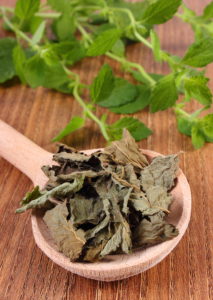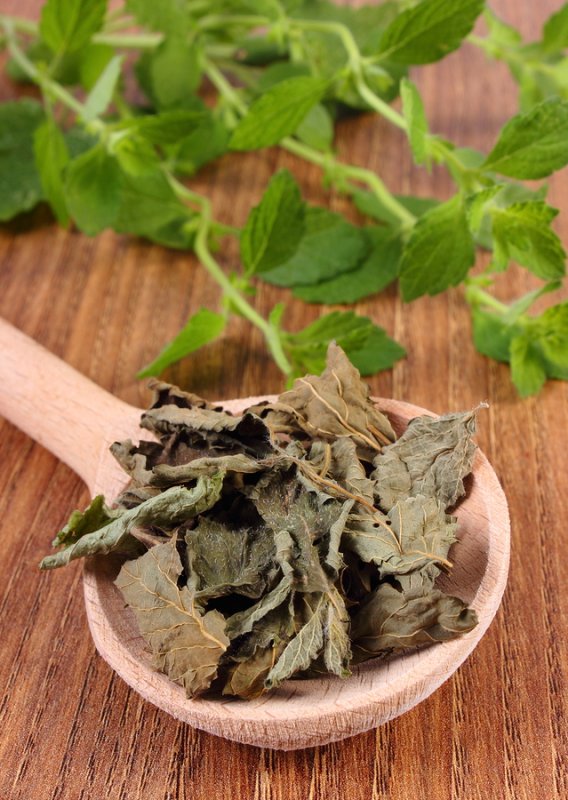Table of Contents
Lemon Balm (Melissa officinalis) is native to the Mediterranean region. And has been cultivated for well over 2,000 years. Melissa officinalis (Melissa is derived from the Greek for ‘honey bee’) was observed by Pliny the Elder as great for attracting bees.
Lemon balm’s appeal continued to grow. It was used as a tea to combat mental confusion, and as an elixir to extend lifespan. In the 17th century, French Carmelite nuns dispensed Carmelite Water. This lemon-balm infused ‘miracle water’ was said to improve memory, vision, and reduce fever, melancholy and congestion.
Melissa tea is used in France today to treat fatigue and headaches. Naturopaths recommend lemon balm to treat cold and flu, lower blood pressure, for insomnia and indigestion.

As a nootropic, lemon balm is used primarily to lower anxiety and boost memory.
Lemon Balm helps:
- Neurotransmitters. Lemon Balm affects brain levels of acetylcholine (ACh). It plays an inhibitory effect on acetylcholinesterase (AChE). AChE is an enzyme that breaks down ACh. Improving memory and cognition.
- Neuroprotectant. Lemon Balm is a potent antioxidant that protects your brain cells from free radical damage.
- Anxiety and stress. Lemon Balm has a significant anxiolytic (anti-anxiety) effect. It raises brain levels of the neurotransmitter GABA by inhibiting the enzyme GABA transaminase. This has an effect on mood regulation.
Overview
Lemon Balm (Melissa officinalis) is an herb that’s native to the Mediterranean region. And now found in gardens throughout Europe and North America.

Lemon balm has a long history as a treatment for stress, anxiety, thyroid issues, indigestion, infections, viruses and inflammation.
Related to the mint family of herbs, lemon balm has a subtle lemon scent. And its small white flowers attract bees. Hence the botanical name ‘Melissa’, which is Greek for honey bee.
The first recorded medical use of lemon balm dates back to Dioscorides, the ancient Greek physician, who used the herb for its anti-bacterial and soothing properties. The famous Swiss Renaissance physician, Paracelsus, called it the “elixir of life”.
In the 16th century, English botanist John Gerard, gave it to his students to “quicken the senses”. This appears to be the first recorded use of the herb for brain and cognitive health.
The most recent research shows lemon balm has remarkable healing and regenerative effects on your brain. It stimulates memory, and supports the health of your brain’s white matter.
Lemon balm’s two primary compounds that affect brain health are eugenol and rosmarinic acid.[i]
Eugenol is an antioxidant 5-times more potent than alpha-tocopherol found in Vitamin E. So lemon balm acts to boost your body’s natural healing processes by eliminating free radicals that damage brain cells.
And lemon balm helps increase levels of your body’s most powerful built-in antioxidants, dismutase and glutathione peroxidase.[ii]
Rosmarinic acid promotes an anti-depressant effect in your brain by downregulating mitogen-activated protein kinase phosphatase-1 (Mkp-1). And it upregulates brain-derived neurotrophic factor (BDNF), along with boosting dopamine synthesis.[iii]
How does Lemon Balm work in the Brain?
Lemon Balm boosts brain health and function in several ways. But two in particular stand out.
- Lemon Balm boosts memory. Lemon balm increases the activity of the neurotransmitter acetylcholine (ACh) in your brain. When your brain sends signals, it uses acetylcholine to keep the signals moving. But once used, your brain removes acetylcholine with an enzyme called acetylcholinesterase (AChE).[iv]
But if you have too much AChE, as is the case with Alzheimer’s patients, it restricts brain signaling. One way to prevent this signal failure is to prevent the breakdown of acetylcholine.
The compound rosmarinic acid in lemon balm encourages blood flow, which helps to keep brain cells from dying.[v] And it inhibits the formation of AChE.
The result is that your brain is stimulated, memories continue to form, and brain fog is eliminated.
- Lemon Balm reduces stress. One-way lemon balm does this is to promote GABA, a glutamate inhibitor in your brain. Glutamate excites brain cells to act. While this excitation is necessary, too much glutamate results in cell death.
Lemon balm promotes a better balance in glutamate levels, and helps new cell growth.[vi] The result is a boost in memory and reduction in stress. Largely due to eugenol, one of the components of lemon balm.
How things go bad
Chronic stress, anxiety, poor blood flow and free radicals (oxidation) can damage your brain. And one of the ways this manifests is memory loss.
It comes as no surprise that people with memory loss experience higher rates of anxiety and depression. As verified in one Australian research study.[vii]
↓ Chronic stress reduces memory capacity
↓ Toxins kill brain cells from the inside
↓ Free radicals destroy neurons and synapses
↓ Acetylcholine (ACh) levels decline
↓ Brain-derived neurotrophic factor (BDNF) declines
Under conditions of chronic stress your brain loses the capacity to transmit signals between neurons efficiently. Memory, cognition, and decision-making all suffer as a result.
Lemon Balm benefits
Lemon Balm undoes damage to the brain caused by chronic stress and oxidative damage. It boosts GABA levels and keeps toxic glutamate overload in check.
Lemon balm inhibits the enzyme AChE that breaks down acetylcholine (ACh) levels in your brain. Boosting ACh improves memory, recall and cognition.
Rosmarinic acid in lemon balm works as an antidepressant. And boosts brain-derived neurotrophic factor (BDNF) which promotes the growth, maturation and maintenance of brain cells.
And the eugenol in lemon balm is a very powerful antioxidant. Eliminating oxidative damage in brain cells by neutralizing free radicals. And boosting your brain’s own antioxidants to provide even more protection.
How does Lemon Balm feel?
The effects of supplementing with Lemon Balm (Melissa officinalis) can provide an anti-anxiety effect within minutes of taking it. Some users say it works as well as popping a Xanax®.
You should experience an increase in focus along with a sense of calm. And even though lemon balm works well as a sleep aid, taking it during the day shouldn’t make you drowsy.
Users report lemon balm effective in taming racing thoughts that come with Obsessive Compulsive Disorder (OCD). Some even use lemon balm as an effective way to control irritable bowel syndrome (IBS).
Lemon Balm Clinical Research
Research continues in medicinal plants and herbs that have been used for millennia to treat cognition and memory problems. One study conducted at the University of Newcastle upon Tyne in the UK, found Melissa officinalis to be one of the strongest in effects on acetylcholine receptors. And being an effective aid for memory.[viii]
Lemon Balm as a Nootropic
Lemon Balm has been shown to improve problem-solving and memory in both human and animal models. And age seems to make no difference. All groups using lemon balm showed boosts in recall and problem-solving.
Some recent studies with Alzheimer’s patients have shown improvement when using lemon balm. In one study done in China, researchers gave Sprague Dawley rats eugenol.
One of the active compounds found in lemon balm, eugenol is a potent antioxidant. In this case it helped test subjects get their memory back.[ix]
Another study noted that lemon balm inhibits acetylcholinesterase (AChE). This enzyme breaks down the critical neurotransmitter acetylcholine (ACh). ACh is crucial to creating memories and cognition. Lemon balm was shown to boost and support mood and memory.[x]
Lemon Balm for Stress Reduction
A double-blind, placebo-controlled experiment was conducted in the UK with 18 healthy volunteers. The subjects received two separate single doses of standardized lemon balm extract (300 mg and 600 mg), or a placebo, on separate days. Followed by a 7-day washout period.
Mood was assessed before dosing, and 1-hour after dosing with lemon balm extract. The study subjects did a 20-minute version of the Defined Intensity Stressor Simulation (DISS) battery of tests.
The results showed that a 600 mg dose of lemon balm eliminated the negative mood effects of doing the DISS tests. They reported an increase in calmness and they were more alert.
The researchers also reported a significant increase in mathematical processing, with no reduction in accuracy. This was after taking the lower 300 mg dose.
The nootropic benefits of lemon balm, according to this test, was a boost in cognition, and had a calming effect.[xi]
Lemon Balm Recommended Dosage
Lemon balm has a long history of use in treating a host of ailments. Including memory and cognition, gas, bloating, earache, vomiting, headache, toothache and insomnia.
 For nootropic use, Melissa officinalis (lemon balm) comes in tea and capsule form. For the most potent dosage find lemon balm extract capsules.
For nootropic use, Melissa officinalis (lemon balm) comes in tea and capsule form. For the most potent dosage find lemon balm extract capsules.
The suggested dose by most naturopaths and alternative health doctors is 300 mg of lemon balm extract 2-3 times per day.
Dosage of lemon balm leaf as a tea is 1 – 2 grams per cup of tea.
You can use lemon balm in the morning to address daytime anxiety. And towards evening to support relaxation and sleep.
Lemon Balm Side Effects
Lemon balm is considered non-toxic and very safe for most users. Most neurohackers won’t experience any side effects.
Note: Lemon balm may have an “antithyrotropic effect“. So if you’re hypothyroid, and on thyroid medication, you may want to avoid using lemon balm.
And use caution when combining lemon balm with; anti-anxiety meds, anti-histamines, muscle relaxers, anti-seizure drugs or tranquilizers.
Type of Lemon Balm to buy
For nootropic use, lemon balm supplements are available as loose-leaf tea, tinctures, and capsules. Most neurohackers use lemon balm capsules which come as ground leaves, or an extract.
The lowest active dose is 300 mg of standard lemon balm. Supplementing above this dose seems to offer dose-dependent benefits. In other words, you’ll get more benefit by taking higher doses. (i.e. 300 mg lemon balm 2-times per day).
Nootropics Expert Recommendation
Lemon Balm extract 300 – 600 mg per day
 I recommend using Lemon Balm as a nootropic supplement.
I recommend using Lemon Balm as a nootropic supplement.
Your body does not make Lemon Balm on its own. So you must take it as a supplement.
Lemon Balm is especially helpful for those suffering from anxiety and stress. Studies show it helps stop and reverse the devastating effects of anxiety and stress on your brain, and body. This nootropic helps repair damage to brain cells caused by chronic stress and anxiety.
Lemon balm is reported to work well for those dealing with Obsessive Compulsive Disorder (OCD). Taming racing thoughts, and helpful in dealing with stressful situations.
Lemon balm is also helpful for those suffering from Alzheimer’s. It has been shown to help reduce agitation and improve symptoms of mild to moderate Alzheimer’s disease. It may also be of benefit in relieving some symptoms of ADHD.
You can safely take up to 900 mg of Lemon Balm (Melissa officinalis) extract daily if needed. One dose first thing in the morning. One dose early afternoon. And the last dose in the evening.
And for memory, lemon balm is great to stack with CDP Choline and Acetyl L-Carnitine.









Join The Discussion - 187 comments
Flawmi
November 18, 2020
Hi, I have a question. I am from South Korea and my English is not very good. Excuse me.
Originally I had great results with lemon balm. I drank lemon balm tea and felt great relaxation and calmness. Even my eyesight became brighter.
But these days I don’t feel anything from taking lemon balm. The cause, I suspect, is two things.
1. Caffeine (Coffee)
I didn’t drank coffee, but nowadays I do. I drank to the point that I developed a caffeine tolerance. I think maybe this is the reason lemon balm doesn’t work for me anymore. What do you think?
2. I got Schizophrenia and started to take Schizophrenia meds ‘ Zyprexa(Olanzapine) ‘
Of the two, I think the latter is more probable suspect. What do you think?
I even want to stop taking Zyprexa and start taking Lemon balm again, because the relaxation lemon balm gave me when that worked is more helpful to my schizophrenia than Zyprexa.
I have one more question. Does lemon balm build tolerance?
David Tomen
November 19, 2020
Flawmi, it’s likely the combination of the two changes you made. I suggest you learn the mechanism of action of caffeine (https://nootropicsexpert.com/caffeine/) and that of Olanzapine (on Wikipedia). And compare those with how Lemon Balm works in your brain. It could be either one is inhibiting the action of Lemon Balm or the combination of the two.
I’ve never heard of someone growing intolerant to Lemon Balm.
Mike
October 4, 2020
Hi David,
You say Lemon Balm enhances the effects of anti-anxiety meds and to use it with caution. Is it safe to use Lemon Balm with Klonopin and reduce the amount of Klonopin? For, example, instead of taking 1mg of Klonopin, I would take half a mg of Klonopin and 300mg of Lemon Balm extract.
M
David Tomen
October 5, 2020
Mike, in the “Side Effects” section above I said to use caution about using Lemon Balm with other meds including anti-anxiety meds. It’s not contraindicated but you could get yourself in trouble.
Because Klonopin is a benzo that binds to the GABAa receptor which increases the effects of GABA. And Lemon Balm inhibits the enzyme GABA transaminase which also forces GABA to be more effective. So it’s like taking double or triple your regular dose of Klonopin if you use them together.
Robert L
January 31, 2020
Day 1 trying Lemon Balm [1/31/2020 630pm]
By Nootropics Depot
500 mg (it can be cut in half, but i took the 500)
David Tomen – i didn’t see “when” to take it. Is a 9am / 9pm ok?
David Tomen
February 1, 2020
Robert, you can use Lemon Balm in the morning to address daytime anxiety. And towards evening to support relaxation and sleep.
Robert L
February 8, 2020
It’s now been over a week using 500 mg 2 times a day.
Honestly – I don’t feel anything at all.
Is this a Nootropic that takes time?
I do have Chronic stress in life going on – as you and I have spoken about on our call.
I have used the others supplements as well – and still no affect / change.
David Tomen
February 9, 2020
Robert, it should have worked by now for anxiety. But some of these adaptogens can take up to 3 – 4 weeks of daily dosing before you starting experiencing its benefits.
It could be that this nootropic is not for you. Lemon Balm affects acetylcholine and GABA. But those two neurotransmitters may not be the cause of your anxiety problem. And if they are maybe Lemon Balm is not enough. And you may need something like Alpha GPC to raise acetylcholine even further. And a GABA supplement to raise GABA further.
There is no harm in continuing to use Lemon Balm. But you may also want to try the precursors for each of the other neurotransmitters (i.e. dopamine, serotonin, glutamine, etc.) one at at time to see if one of those work.
ali
February 10, 2020
As with most herbs, I would try the form closest to the original. Lemon Balm (unlike many other herbs that aren’t grown in the US) can even be grown in a pot. Leaves can be used in salad, sandwich, or tea. I have used Lemon Balm in the past, it’s great for relaxation. Smells good too. Tea can also be bought. lemon balm tea > supplements.
Robert L.
February 25, 2020
David,
Serious Question
If one Stops Lemon Balm after taking it daily – IS There a strong relapse in anxiety?
I stopped it for maybe 3 days and i feel like I’m going through Benzo Withdrawal all over again. coping skills i worked hard to get are barely helping.
Is there any science that Lemon Balm affects or over clocks the Receptor like Benzos do?
Robert L.
February 25, 2020
@#$&%
Found an article
Hope this is not strongly the case.
I was getting better, my anxiety was rather well managed… i was looking for rest and depression help.
I cant go through another withdrawal! It destroyed me.
https://www.ncbi.nlm.nih.gov/pmc/articles/PMC4384870/
David Tomen
February 25, 2020
Robert, this is news to me and likely 10’s of thousands of Lemon Balm users worldwide. Keep in mind that this is a case of report of one person. It’s the first and only report I’ve seen like this. And now you …
Some people report that Lemon Balm works for them as well as Xanax. But the mechanism of action is different. Benzos typically act on GABAa benzodiazepine receptors. And Lemon Balm increases GABA by inhibiting the enzyme GABA transaminase. So both increase levels of GABA in the brain.
It sounds like Lemon Balm is not the right choice for you. And that your brain is especially sensitive to GABA manipulation.
You said, “I was getting better, my anxiety was rather well managed”. It sounds like this was before you tried Lemon Balm. And that you should start exploring other methods (i.e. other neurotransmitters and possibly inflammation) in your search for relief from depression. And avoid anything that affects GABA.
Robert L
January 27, 2020
Acetylcholinesterase – Being the “Break Down” of ACh, doesn’t that lower levels of ACh? Which I thought “more” helps in synaptic communication?
David Tomen
January 28, 2020
Robert, the rosmarinic acid in Lemon Balm inhibits or is an antagonist of acetylcholinesterase (AChE) which forces more acetylcholine into extracellular space. Making more acetylcholine available to connect with acetylcholine receptors.
More acetylcholinesterase (AChE) of course would have the opposite effect and would suppress acetylcholine levels.
JQ
November 27, 2019
I would like to try Lemon balm but i tried Ashwagandha and it jacked my TSH numbers up. Does lemon balm have the same mechanism as Ashwagandha?
David Tomen
November 27, 2019
JQ, it’s not the same mechanism but Lemon balm may have an “antithyrotropic effect“. So if you have thyroid problems you should avoid Lemon Balm.
Brooke
October 23, 2019
Hi David,
Would you happen to know if Lemon Balm is safe to take in conjunction with an SSRI such as Lexapro?
How about Ashwagahnda?
Thanks!
David Tomen
October 24, 2019
Brooke, Ashwagandha can enhance the effects of Lexapro so be careful because it would be like taking double the amount of Lexapro.
Lemon Balm should be safe but I’d still use caution. Try a low dose and see how you feel.
Danira
April 11, 2020
I take 100 mg of zoloft everyday and i found a supplement that has 200mg of lemon balm in it… is that too much..?
David Tomen
April 23, 2020
Danira, Zoloft is an SSRI so use it with Lemon Balm with caution. There’s no direct contraindication. But combining them is a wild card because you don’t know what could happen. So be careful.
Ryan Rogerst
October 1, 2019
I took one Melisa tea bag at bed time,and slept well the 1st nite,but not as well on nite 2 and 3,and stopped taking because I was groggy,and fatiqued all day,right up till bed time. Felt terrible,until discontinueing it
Was this too much,should I try a capsule ?
David Tomen
October 2, 2019
Ryan, a couple things may be going on here.
First, lemon balm may have an “antithyrotropic effect“. So if you’re hypothyroid, and/or on thyroid medication, you may want to avoid using lemon balm. Have you ever been diagnosed or suspected you have thyroid issues? I ask because there are tens of thousands of people in the USA alone who are likely hypothyroid but have never been diagnosed.
Thing #2 is it’s difficult to know what’s in that tea bag. You have no real way of measuring. Better to try a Lemon Balm Extract which should be a guaranteed potency. If that causes the same side effects I’d quit Lemon Balm and get your thyroid hormones checked.
Ryan Rogerst
October 2, 2019
Thank you. I have my thyroid checked at my 2 yr. full medical,no troubles there so far.
I will try the extract,is there a starting amount you would recommend ?
Do I put this in juice or something?
David Tomen
October 2, 2019
Ryan, get it in capsules and alternative health doctors recommend 300 mg of lemon balm extract 2-3 times per day. But I’d start one dose per day first and see how you feel.
I wish there was a concise way to talk about thyroid problems here without insulting anyone. Including your doctor. But nearly every mainstream doctor and nurse in most of the world base their thyroid health decision on TSH. Which is a perfectly useless blood test unless it is accompanied by Free T4, Free T3 and reverse T3.
I know because I’ve been dealing with this for nearly 7 years. And a young ER doctor pronounced me hyperthyroid just last week. A decision based on TSH. Which I know is completely not true.
If you are interested, you can learn more here: https://stopthethyroidmadness.com/
Ryan Rogerst
October 2, 2019
Thank you,I appreciate this info. I will report back tomorrow,after taking a drop of the extract. [ My wife bought an organic extract in a bottle ]
Henry
September 26, 2019
David, can I take lemon balm and Phenibut on the same day?
Thank you very much!
David Tomen
September 27, 2019
Henry, probably not a good idea. And not sure why you would want to.
Henry
September 28, 2019
Thanks, I’ll probably not. It’s just my anxiety can be overwhelming sometimes.
Robert L
January 31, 2020
Henry,
How you been since Sept?
Any stacks working?